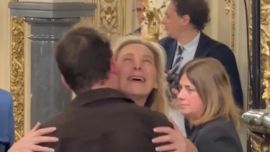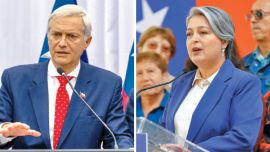Mao Zedong once apparently said that if the whole of China’s population decided to stand on a chair and jump to the ground at the same time, they would shake the Earth. Probably apocryphal, it hasn’t stopped thousands from trying to figure out whether that’s physically possible, as a quick Google search reveals. Still, this idea acts as a good metaphor to explain what’s needed to get Argentina out of its current political and economic slump. Increasingly virulent economists have taken to TV and radio shows to call for further austerity through shock and the use of orthodox economic policy, while several businessmen of high regard have rejoiced at the aggressive devaluation that has “made the country more competitive,” disregarding the social costs of pushing millions more into poverty. What President Mauricio Macri needs is not more neoliberalism — which would result in improved macroeconomic indicators and the applause of the International Monetary Fund — but a broad alliance that includes society’s most important actors in order to generate the conditions for sustained and inclusive growth. Non-Kirchnerite politicians, businessmen, and society need a realistic plan that tackles both the fiscal deficit and the chronic unproductiveness of the Argentine economy, lowering inflation without tipping the country into a recession that, at this point, is inevitable.
Smart economists like José Luis Espert and Javier Milei have become celebrities these days. Jumping from conferences to TV shows, they blast the Macri administration’s faulty management of the economy, failure to lower inflation and the need to request a bailout from Christine Lagarde’s IMF. They publish interesting articles (Espert was interviewed for the Times in June) asking the government to lower spending, while mocking those who consider themselves followers of John Maynard Keynes. Both of them consider themselves in the tradition of the Austrian School of economic liberals like Friedrich Hayek and Ludwig von Mises.
In his weekly editorial, Jorge Fontevecchia (my father) mentioned Cristiano Rattazzi (Fiat Argentina), Paolo Rocca (Techint), and Dante Sica (flaming Production Minister) highlighting the benefits of the recent devaluation. While we started out 2018 with an expected inflation rate of 20 percent and a dollar exchange rate of around 20 pesos, current estimates put inflation at 30 percent and the year-end exchange rate at 30 pesos, he explained in a column titled ‘Del 20-20 al 30-30.’ To quote: “If the current situation persists, that is with a devaluation that is 50 percent higher than expected and inflation that is also 50 percent higher, the end result will be that everyone’s lot will be worse off.”
The combination of further austerity and devaluation would be devastating for Argentina, deepening the current bout of stagflation while continuing to erode purchasing power in an economy that depends on internal consumption for growth. Cristina Fernández de Kirchner understood this well. Maybe too well. Her solution was a populist consumption party financed by the looting of the State and then the printing press, leading to runaway inflation and a State apparatus that is fat and broke. Macri’s mission was to deactivate the bomb Cristina left behind, lifting currency controls and lowering trade barriers. But he never turned off the printing press. As Milei has noted, social spending has actually increased while monetary expansion holds steady. At the helm of Central Bank was Federico Sturzenegger, a staunch monetarist, who sought to tackle inflation with high interest rates.
Sturzenegger was forced to resign by Cabinet Chief Marcos Peña, months after being publicly humiliated at a press conference led by the aforementioned Peña, Economy Minister Nicolás Dujovne and then Finance Minister Luis “Toto” Caputo (current Central Bank president) where he was prompted to “acknowledge” that his inflation projections were overly optimistic. Failing to comprehend the normative nature of Central Bank inflation targets, Peña et al. contributed in fuelling even higher inflation which, coupled with a dramatic devaluation caused both by exogenous forces and self-inflicted wounds, took Argentina once again to the doorsteps of the IMF. Sturzenegger left behind another ticking time bomb too: some one billion pesos in short-term paper called Lebacs which were used to sterilise or soak up excess pesos injected into the system as a consequence of foreign debt sales in dollars. The massive stock of Lebacs attracted huge amounts of speculative capital into the country, and fuels intense volatility during rollover dates. Caputo is now looking to replace Lebacs with dollar-denominated Letes, longer in duration and less volatile.
While the self-proclaimed followers of the Austrian School are right to point out that the government needs to reduce the fiscal deficit, they seem to be seeing only half the issue. Not only is there a monetary phenomenon, but Argentina is on the brink of a recession that will require both economics and politics if it is to solved. As has been mentioned countless times in these pages, Macri needs to lay out a plan to recover productivity across major economic sectors which includes lowering taxes while broadening the base by disincentivising informal labour. Labour laws need to be relaxed, trade agreements need to be signed, and investment in infrastructure needs to continue. Consumption, the main component of GDP, is necessary for growth.
For this to occur, the leading Cambiemos (Let’s Change) coalition needs to stop thinking in electoral terms and seek common ground with the Peronists. The genius behind Macri’s political strategy has been continued polarisation with Cristina Fernández de Kirchner, which in turn leads to the fragmentation of the opposition. This is the consequence of a fragmented electorate which begets gridlock in Congress and electoral speculation among some Peronists like Sergio Massa, Miguel Ángel Pichetto, and Felipe Solá, eroding governability. The president needs a working opposition that generates policies through consensus. This requires not only constant conversation with the Peronists, but with major businessmen who need stability and predictability if they are to invest in the country. Macri also needs more honest communication with the people, not just talking about hope but detailing his plan to get us out of this mess. Supposedly, this is what his protégés María Eugenia Vidal (Buenos Aires Province governor) and Horacio Rodríguez Larreta (City mayor) are trying to convince him of, to the disliking of Peña.
Paraphrasing the apocryphal Mao, if all of Argentina decided to stand on a chair and jump at the same time, focusing on productivity which in turn would translate into lower prices, more jobs and therefore greater consumption, then we could jumpstart the economy. Quite literally. We need a politically pragmatic Macri with an eye for reducing the deficit and another looking to foster growth. If he doubles down only on Austrian economics, his reelection in 2019 will be in danger.



















Comments